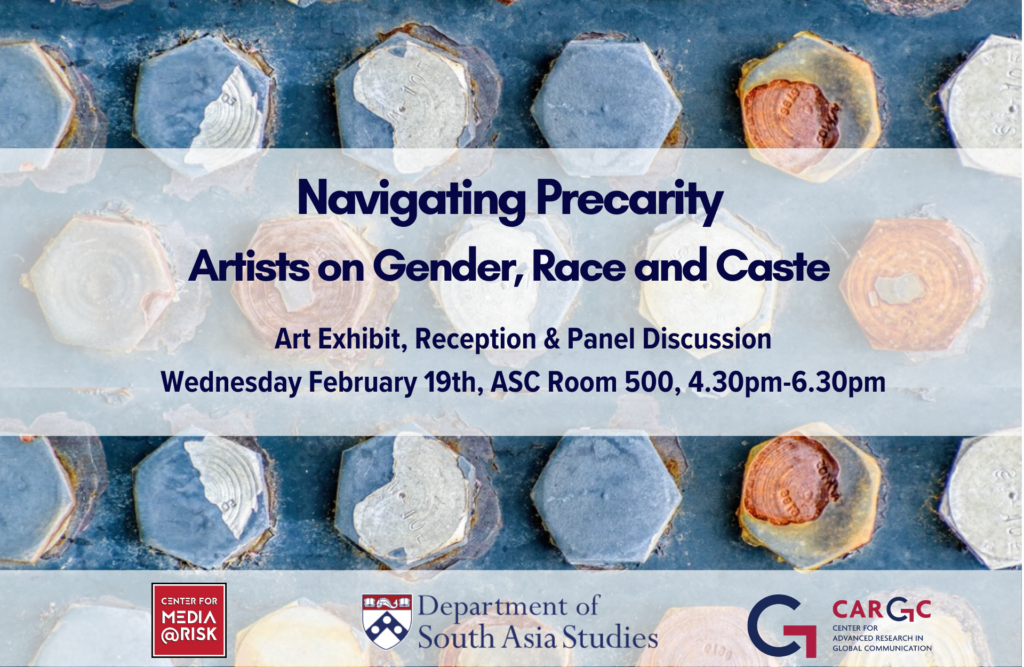Speaker(s):

About the Event
In an art world rife with institutionalized instability, this panel and art exhibit convenes three artists from Mumbai, Delhi and Philadelphia to unpack the fraught relationship between creative practice and the systems that shape it. In India, caste elites act as gatekeepers in institutional art spaces, and caste-marginalized artists have to cross many barriers to find their footing in the art scene. Race, gender and class play similar constraining roles in the United States. Against this backdrop, the panel discussion will ask: How do artists sustain their work in spaces that support and constrain them? What does this mean for the future of art as a vehicle for political resistance, community building, and social change? And what can we learn about institutionalized precarity when artists share their experiences across different national contexts? Join this panel and exhibit to view powerful artworks and hear from artists who forge their way amid precarity, resist marginalization and embrace art’s potential as a force for global and local resistance.
About the Speakers

Chelsey Luster is a Philadelphia-based curator and visual artist from Baltimore, Maryland. She earned her Bachelor of Fine Arts from Tyler School of Art and Architecture. Chelsey’s artistic practice focuses on exploring the complexities of safe spaces within Queer and Black culture. Through mixed-media paintings and installations, she gives agency to her subjects, telling their stories of physical and mental safe spaces inspired by interviews and photoshoots. Her work has been featured in the Philadelphia Museum of Art and the Michener Art Museum, and is collected by Penn Medicine.
As a curator, Chelsey centers experimental installations and storytelling through diverse narratives. Her curatorial approach reimagines the role of the curator as a collaborator and community-builder. This is evident in her work with Philadelphia art institutions like IceBox Project Space, Da Vinci Art Alliance, and the William Way LGBT+ Center, where her exhibitions act as platforms for social resistance. As the Exhibition Manager at Philadelphia’s Magic Gardens, she continues to shape the city’s art scene with her unique blend of artistic vision and curatorial practice.
Bhumika Saraswati is an award-winning Indian journalist, photographer, filmmaker, and educator whose work documents lives and narratives often overlooked or erased. Specializing in long-term, visual-first storytelling, she focuses on gender, caste, climate, and health. Raised in an “untouchable” Dalit household by a strong single mother, Bhumika’s storytelling is deeply personal and shaped by lived experience.
Her work has received local and international recognition, including the UN-Laadli Media Award, the Human Rights Press Award, and the RedInk Award. She has been published in the Associated Press, The New York Times, The Caravan, Outlook Magazine, The Hindu and others. She founded Kranti Collective, a community space in Delhi, and leads Unequal Heat (@heat.southasia), documenting how rising temperatures disproportionately impact marginalized communities. She is currently the Equity Editor at Nivarana, a public health magazine.
Shrujana N Shridhar is an artist and illustrator based in Mumbai. Her practice examines the intersection of caste, gender and capitalism. It honours the resilience of communities that fought caste and gender oppressions for centuries. Her works have been published in magazines in India and abroad. Shrujana has written and illustrated children’s books. She runs the Dalit Panther Archive, digitising and archiving Little Magazines and literature published by the members of the Dalit Panther movement. She is a co-founder of Mavelinadu Collective, an anti-caste publication. She has received the SSAF–AAA Research Grant for Archiving Histories of Art, Ideas and Visual Culture in 2019.
